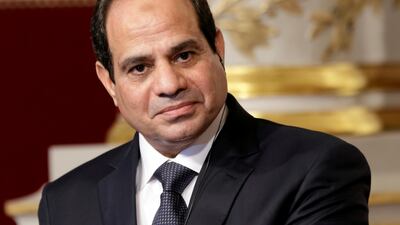Egyptian president Abdel Fatah El Sisi has ruled out a constitutional amendment to extend his time in power beyond the current limit of two four-year terms.
Speaking to CNBC, Mr El Sisi said presidential elections will take place as scheduled in March or April of next year and that he will not run again in 2022.
Mr El Sisi was elected to office in 2014, a year after he led the military's ousting of an elected but divisive president, the Muslim Brotherhood's Mohammed Morsi. He has strongly suggested he will seek a second term in office in elections next year, but has yet to make a formal announcement.
Mr El Sisi's remarks, which were aired late on Monday, were the first to publicly detail his thoughts on the constitutional clause that limits the time presidents can serve to two four-year terms. Legislators and celebrities loyal to Mr El Sisi have in recent months been calling for the constitution to be amended to make presidential terms longer than four years.
________________
Read more:
Egypt replaces defence and security chiefs and names Libya as greatest threat
Cairo named riskiest megacity for women, worse since Arab spring
Egypt searches for answers after police massacre
________________
They argue that the existing four-year terms are not long enough to allow Mr El Sisi to implement his ambitious plans for overhauling the economy, upgrading the country's infrastructure and crushing an insurgency by Islamic militants.
"I am with preserving the [clause on] two four-year terms and not change it," he said. "We will not interfere with it."
But Mr El Sisi appeared to give himself some leeway, using his hallmark phrase of "the people's will" as the deciding factor on who gets to be president. "I am not in favour of amending the constitution in this period," he said. "It does not suit me as a president to stay one day [in office] against the Egyptian people's will. This is not just talk for television, these are values I embrace and principles I am keen on. A president who respects his people and his principles will not stay one day against the will of his people."
Mr El Sisi insists Egypt has changed since the 2011 uprising that toppled Hosni Mubarak and says he is working to establish a "civilian and democratic" state.
Commenting on security in the region Mr El Sisi called on Middle Eastern states to maintain stability just as tensions were heightening between Saudi Arabia and Lebanon.
"I want to say that the stability of the region is very important and we all have to protect it and I am talking to all the parties in the region to preserve it. The region has more than enough fighting and turmoil and lack of stability. We don’t want to add more instability and fighting. This message is for everyone," he said.
The Lebanese prime minister Saad Hariri announced his resignation on Saturday, citing fear of assassination and sharply criticising Iranian influence in Lebanon and the wider region. Mr Hariri made his announcement from the Saudi Arabian capital of Riyadh after travelling there from Beirut on Friday.
When asked whether the time had come for Egypt to consider its own measures against Hizbollah, the Lebanese political party and militia that receives Iranian backing, Mr El Sisi said, "The subject is not about taking on or not taking on, the subject is about the status of the fragile stability in the region in light of the unrest facing the region. The region cannot support more turmoil.
"I want to convey that we are keen on the unity of Lebanon and its stability and peace... We preserve its unity, we preserve its stability, and we preserve its independence."
Mr El Sisi said that Cairo is no seeing to impose any measures against Hizbollah because countries such as Iraq, Libya, Yemen and Syria would all be vulnerable to an escalation of turmoil.
"We want our national security, Arab national security, and Gulf national security to stay untouched. That is what we are looking for. National security in the Gulf is part of our security and our national security is part of the security of the Gulf," he said.
His comments to CNBC came just hours after a prominent human rights lawyer declared he would run against Mr El Sisi in next year's elections, a move unlikely to pose a serious challenge to the incumbent but which would provide a test for his popularity.
"Egypt is in crisis after four years of rule by Abdel Fatah El Sisi," the lawyer, Khaled Ali, said on Monday when he announced his candidacy.
"We have the right to have democratic elections … [but] we are expecting a crackdown and repression."

